初一英语听课记录范文(2)
七年级英语听课记录范文

七年级英语听课记录范文English:Today I had an English class. Our teacher, Mr. Smith, started the class by asking us to read a passage from a book. Then, he asked us to discuss the main idea of the passage with our classmates. After that, he introduced anew grammar point and gave us some examples to help us understand it better. We took notes while he was explaining.Next, we did a listening exercise. Mr. Smith played an audio clip and asked us to listen carefully and answer some questions about it. We had to pay close attention to the details in the audio clip in order to answer the questions correctly.Then, we moved on to a speaking activity. We weredivided into groups and given a topic to discuss. Eachgroup had to come up with their own ideas and present themto the class. This helped us practice speaking in Englishand also improved our confidence in using the language.Finally, we did a writing exercise. Mr. Smith asked usto write a short paragraph about our weekend activities. Hewalked around the classroom and checked our work, giving us feedback on our writing.Overall, it was a very productive and engaging class.中文:今天我上了一节英语课。
初中英语听课记录 (2)

初中英语听课记录1. 第一节课:英语的基本单词和发音在这节课上,老师主要教我们一些基本的英语单词和它们的发音。
我们通过听录音和跟读的方式来学习这些单词的正确发音。
老师用了一些有趣的动画图片来帮助我们记忆这些单词,让我们对英语产生了浓厚的兴趣。
2. 第二节课:日常生活用语这节课上,老师教我们一些常用的日常生活用语,比如问候语、道歉、感谢等。
老师通过举例和角色扮演的方式让我们更好地理解和记忆这些用语。
我们都积极参与课堂互动,学到了很多实用的英语表达。
3. 第三节课:英语听力训练在这节课上,老师给我们播放了一段简短的英语对话,并让我们在听完对话后回答相关的问题。
这对我们的听力训练很有帮助,提高了我们对英语的理解能力。
老师还教了我们一些听力技巧,比如注意关键词和上下文的联系等。
4. 第四节课:英语口语练习这节课上,老师让我们进行了口语练习。
我们分成小组进行了角色扮演,在模拟的情景中运用英语进行对话。
这种练习提高了我们的口语表达能力,更加自信地和他人用英语交流。
老师还给了我们一些建议,如如何提高口语流利度和自然度。
5. 第五节课:阅读理解训练这节课上,老师给我们发放了一些英语阅读材料,并让我们阅读后回答相关问题。
通过阅读,我们不仅提高了对英语文章的理解能力,还学到了一些新的词汇和表达方式。
老师还教了我们一些阅读技巧,如如何寻找关键信息和理解文章的主旨。
6. 第六节课:写作技巧和练习在这节课上,老师讲解了一些英语写作的基本技巧,包括如何构思、如何组织文章、如何运用词汇和语法等。
老师还给我们布置了一篇写作作业,让我们把刚学到的知识应用到实践中。
这次写作练习对我们的写作能力提高有很大帮助。
总结起来,这几节初中英语课程给了我很多启发和帮助。
我学到了很多实用的英语知识,提高了听说读写的综合能力。
同时,老师的引导和鼓励也让我对英语学习充满了信心和动力。
我相信,在接下来的学习中,我会越来越喜欢英语,取得更好的成绩。
英语听课记录范文(实用6篇)
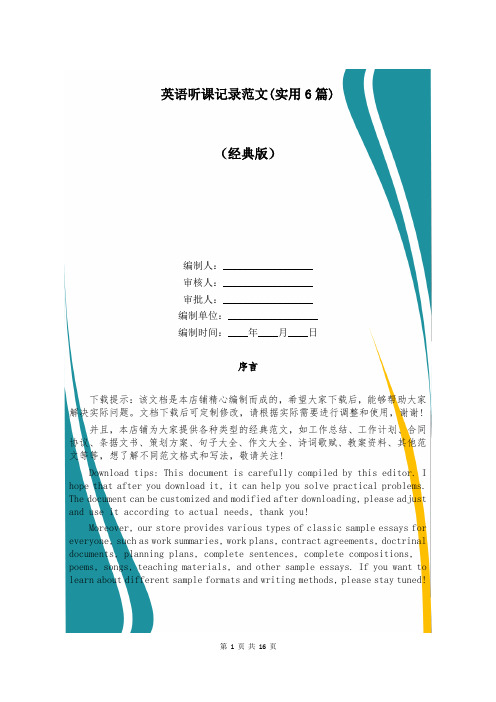
英语听课记录范文(实用6篇)(经典版)编制人:__________________审核人:__________________审批人:__________________编制单位:__________________编制时间:____年____月____日序言下载提示:该文档是本店铺精心编制而成的,希望大家下载后,能够帮助大家解决实际问题。
文档下载后可定制修改,请根据实际需要进行调整和使用,谢谢!并且,本店铺为大家提供各种类型的经典范文,如工作总结、工作计划、合同协议、条据文书、策划方案、句子大全、作文大全、诗词歌赋、教案资料、其他范文等等,想了解不同范文格式和写法,敬请关注!Download tips: This document is carefully compiled by this editor. I hope that after you download it, it can help you solve practical problems. The document can be customized and modified after downloading, please adjust and use it according to actual needs, thank you!Moreover, our store provides various types of classic sample essays for everyone, such as work summaries, work plans, contract agreements, doctrinal documents, planning plans, complete sentences, complete compositions, poems, songs, teaching materials, and other sample essays. If you want to learn about different sample formats and writing methods, please stay tuned!英语听课记录范文(实用6篇)英语听课记录范文第1篇五彩缤纷丰收11、秋天的雨香甜好闻(钥匙)传递信息欢乐听课评析这堂课的板书简明扼要地反映了课文的主要资料,脉络清楚,丰收和欢乐两个词语点明了课文的中心,深化了文章的主题。
英语听课记录文档2篇

英语听课记录文档2篇English listening records编订:JinTai College英语听课记录文档2篇小泰温馨提示:经验交流借助于各种工作研讨、集会演讲或有组织的访谈而进行的信息的交流活动,分享有效经验。
本文档根据主题的经验交流内容要求展开说明,具有实践指导意义,便于学习和使用,本文下载后内容可随意修改调整及打印。
本文简要目录如下:【下载该文档后使用Word打开,按住键盘Ctrl键且鼠标单击目录内容即可跳转到对应篇章】1、篇章1:英语听课记录文档2、篇章2:英语听课后记文档篇章1:英语听课记录文档step 1:warming up1.an activity named “are you smarter than apupil of grade three?”(本堂课对英语课堂现状的一种颠覆,课堂中,让学生看老师“出丑”,考倒老师,让老师说:i am not smarter than a pupil of grade three.确实吸引了听课老师的注意力,但是是不是值得推广,还是值得思考的。
)step 2 pre-task preparationa. select one of the listed items and try to solve the problem.b. organize a contest between the students and teachers.step 3 while-teaching proceduresa .elicit the mascot of beijing olympic games.b. help students to get familiar with fuwa.c. encourage the students to express their desire of cherish the animals.(接下来,通过看一段福娃的录像,让学生学习五个单词 panda swallow, fish, tibetan antelope 来教学i like animals.t: do you like…..?(让学生集体问,全体教师回答,以此方式来进行操练,同样在其他的公开课上及其少见的。
关于初一英语听课记录

关于初一英语听课记录【篇一】初一英语听课记录李老师讲的是四年级的一节英语课,四年级学生对英语已经有了一定的了解而且也有了一年学习英语的基础,对英语学习有较高的学习兴趣。
李老师根据这点课上以学生为主体通过各种各样的教学方法进行愉快的教学,充分调动了学生学习英语的积极性,课堂气氛活跃,目标达成率较高。
现将本节课的成功之处和需改进的地方总结如下:1教学目标明确,重难点突出,教学结构清晰,通过课前播放英语歌曲调动学生学习英语的兴趣,通过复习旧知引导新知过渡自然,环环相扣。
2教师个人素质较高,课堂驾奴能力强,口语流利,动作优美,富有激情,具有亲和力和感染力,自身人格魅力较高,使整个一节课神采飞扬。
3注意教学细节,主要体现在给小组用英文字母命名,努力营造一种英语教学的氛围。
4活动方式多样化,有group work, look and read,等一系列活动。
5准备充分,有课件,图片,卡片等。
建议:1讲解过多,应让学生更可能多的进行练习,以达到学会的目的,给学生竟可能多的创设情景,让学生在真实的语境中真是的运用语言。
2尽可能多的运用英语进行教学,给学生创设学习英语的气氛。
3应该充分体现以学生为主体,以老师为主导的作用,让每个学生都能开口说英语,多利用小组或者两人一组进行操练,以达到学生学习英语的主动性。
【篇二】初一英语听课记录上午听了杨老师的英语课,觉得自己又收获了一把。
老师的课堂都很精彩,教学设计巧妙、安排合理、能充分发挥多媒体教学手段、师生关系和谐,取得了不错的教学效果。
下面,我就具体对杨老师这节课说一说我的个人体会,不当之处,请各位多提宝贵意见!一、注重营造和谐融洽的课堂氛围杨老师教态自然、语调亲切,并能不断地鼓励学生,给学生以勇气。
以无私的爱心、童心去包容学生,用甜甜的微笑面对学生,使学生在和谐融洽的课堂氛围中学习,推动了知识的掌握和智力的发展,达到了较好的教学效果。
二、注重遵循学生的发展认知规律1、旧知引入新知。
七年级英语听课记录范文

七年级英语听课记录范文一、听课基本信息。
1. 听课日期:[具体日期]2. 听课教师:[教师姓名]3. 授课教师:[授课教师姓名]4. 授课班级:七年级[X]班。
5. 授课内容:Unit [X],Section A。
二、教学过程。
(一)导入(Lead - in)(5分钟)1. 授课教师通过展示一些与本单元话题相关的图片(如家庭成员的照片),并提问学生:“What can you see in these pictures?”引导学生用简单的英语单词回答,如“father”“mother”“sister”等。
2. 接着,教师播放了一段简短的视频,视频内容是一个家庭聚会的场景,里面有家庭成员之间的互动对话。
播放完视频后,教师提问:“How many people are there in this family? Who are they?”让学生回忆视频内容并作答。
点评:- 导入方式生动有趣,图片和视频能够吸引学生的注意力,迅速将学生带入到英语学习的氛围中。
- 问题设置简单且具有引导性,适合七年级学生的英语水平,能够让学生轻松开口回答,为后面的学习做好铺垫。
(二)知识呈现(Presentation)(15分钟)1. 教师在黑板上写出本单元的重点单词,如“grandfather”“grandmother”“parent”“brother”“uncle”“aunt”等,一边写一边大声朗读单词,让学生跟读。
2. 针对每个单词,教师都给出了相应的例句,例如:“My grandfather is very kind.”“Her grandmother likes reading books.”并通过简单的动作和表情帮助学生理解例句的含义。
3. 接着,教师利用多媒体展示了一个家族树(family tree)的图片,在家族树的各个分支上标注出刚刚学过的单词,然后指着家族树向学生介绍家庭成员之间的关系,如:“Your father and mother are your parents.”“Your father'sbrother is your uncle.”点评:- 单词教学方法多样,既有跟读又有例句展示,并且结合动作和表情,能够让学生更好地掌握单词的发音和用法。
初中英语听课记录30篇
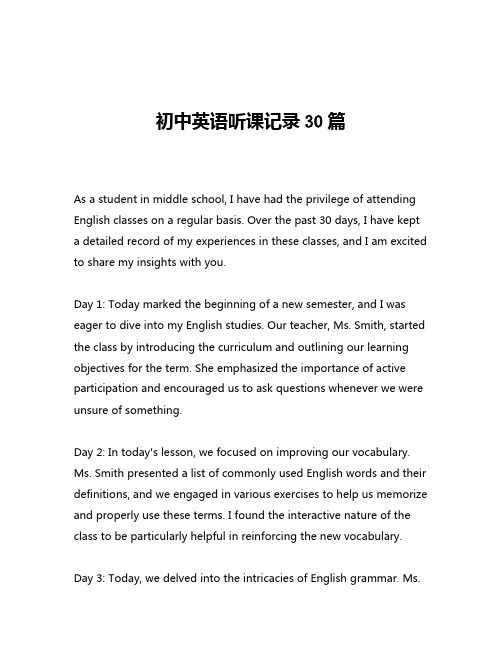
初中英语听课记录30篇As a student in middle school, I have had the privilege of attending English classes on a regular basis. Over the past 30 days, I have kept a detailed record of my experiences in these classes, and I am excited to share my insights with you.Day 1: Today marked the beginning of a new semester, and I was eager to dive into my English studies. Our teacher, Ms. Smith, started the class by introducing the curriculum and outlining our learning objectives for the term. She emphasized the importance of active participation and encouraged us to ask questions whenever we were unsure of something.Day 2: In today's lesson, we focused on improving our vocabulary. Ms. Smith presented a list of commonly used English words and their definitions, and we engaged in various exercises to help us memorize and properly use these terms. I found the interactive nature of the class to be particularly helpful in reinforcing the new vocabulary.Day 3: Today, we delved into the intricacies of English grammar. Ms.Smith explained the different parts of speech and their functions within a sentence. We then had the opportunity to apply our knowledge by identifying the various grammatical elements in sample sentences. I was surprised by how much I was able to learn in just one class period.Day 4: This class was dedicated to practicing our English writing skills. Ms. Smith provided us with a prompt and asked us to compose a short essay. I found this exercise to be both challenging and rewarding, as it allowed me to put my newly acquired vocabulary and grammar knowledge into practice.Day 5: In today's lesson, we explored the importance of pronunciation and intonation in the English language. Ms. Smith led us through a series of tongue twisters and dialogues, encouraging us to pay close attention to our articulation and the rhythm of our speech. I found this activity to be particularly helpful in improving my overall fluency.Day 6: Today, we focused on listening comprehension. Ms. Smith played a series of audio recordings, ranging from news reports to casual conversations, and asked us to answer comprehension questions. I found this exercise to be quite challenging, as it required me to actively listen and process the information being presented.Day 7: In this class, we explored the cultural aspects of the English-speaking world. Ms. Smith discussed the various customs, traditions, and social norms of different English-speaking countries. I found this to be a fascinating and enlightening lesson, as it helped me understand the cultural context behind the language.Day 8: Today, we delved into the world of English literature. Ms. Smith introduced us to a classic short story and led a discussion on the themes, characters, and literary devices used by the author. I was captivated by the depth and complexity of the story, and I found myself eager to explore more works of English literature.Day 9: In this lesson, we focused on improving our English conversation skills. Ms. Smith divided the class into pairs and asked us to engage in a series of role-playing exercises. I found this activity to be both challenging and rewarding, as it allowed me to practice my speaking skills in a real-world context.Day 10: Today, we explored the use of idioms and colloquial expressions in the English language. Ms. Smith presented a variety of common idioms and their meanings, and we discussed how these expressions are used in everyday speech. I found this lesson to be particularly enlightening, as it helped me understand the nuances of the English language.Day 11: In this class, we delved into the world of English poetry. Ms. Smith introduced us to a selection of classic poems and encouraged us to analyze the poetic devices used by the authors. I found this to be a thought-provoking and enriching experience, as it allowed me to appreciate the artistry and creativity inherent in the English language.Day 12: Today, we focused on improving our English reading comprehension skills. Ms. Smith provided us with a series of short passages and asked us to answer questions about the content. I found this exercise to be challenging but rewarding, as it helped me to better understand and interpret written English.Day 13: In this lesson, we explored the use of English in the professional world. Ms. Smith discussed the importance of effective communication in the workplace and provided us with tips and strategies for writing professional emails, resumes, and other business documents. I found this lesson to be particularly relevant and applicable to my future aspirations.Day 14: Today, we delved into the world of English grammar once again, this time focusing on more complex sentence structures and verb tenses. Ms. Smith presented a series of examples and encouraged us to practice using these grammatical concepts in our own writing and speaking. I found this lesson to be both challengingand enlightening, as it helped me to better understand the nuances of the English language.Day 15: In this class, we explored the use of English in the media and popular culture. Ms. Smith presented a series of examples, ranging from news articles to song lyrics, and encouraged us to analyze the language used in these contexts. I found this lesson to be particularly engaging and relevant, as it helped me to understand how the English language is used in the real world.Day 16: Today, we focused on improving our English pronunciation and accent. Ms. Smith led us through a series of exercises designed to help us improve our articulation and intonation. I found this lesson to be particularly helpful, as it allowed me to identify and address any areas of weakness in my spoken English.Day 17: In this lesson, we delved into the world of English literature once again, this time focusing on a more contemporary work. Ms. Smith introduced us to a modern novel and led a discussion on the themes, characters, and writing style of the author. I found this lesson to be both engaging and thought-provoking, as it allowed me to explore the evolution of the English language in a modern context.Day 18: Today, we explored the use of English in the field of science and technology. Ms. Smith presented a series of technical terms andencouraged us to discuss their meanings and applications. I found this lesson to be particularly interesting, as it helped me to understand the role of English in the global scientific community.Day 19: In this class, we focused on improving our English writing skills once again, this time with a focus on persuasive writing. Ms. Smith provided us with a prompt and asked us to compose a persuasive essay. I found this exercise to be both challenging and rewarding, as it allowed me to put my knowledge of vocabulary, grammar, and rhetorical devices into practice.Day 20: Today, we delved into the world of English idioms and slang once again. Ms. Smith presented a series of common expressions and encouraged us to discuss their meanings and origins. I found this lesson to be particularly enlightening, as it helped me to better understand the nuances of the English language and how it is used in everyday speech.Day 21: In this class, we explored the use of English in the field of arts and culture. Ms. Smith presented a series of examples, ranging from film reviews to art critiques, and encouraged us to analyze the language used in these contexts. I found this lesson to be particularly engaging and relevant, as it allowed me to understand the role of English in the global cultural landscape.Day 22: Today, we focused on improving our English listening comprehension skills once again, this time with a focus on more complex audio recordings. Ms. Smith played a series of interviews and news reports, and asked us to answer a series of comprehension questions. I found this exercise to be particularly challenging, but also rewarding, as it helped me to better understand the nuances of spoken English.Day 23: In this lesson, we delved into the world of English grammar once again, this time focusing on the use of modals and conditional structures. Ms. Smith presented a series of examples and encouraged us to practice using these grammatical concepts in our own writing and speaking. I found this lesson to be particularly enlightening, as it helped me to better understand the subtleties of the English language.Day 24: Today, we explored the use of English in the field of business and finance. Ms. Smith presented a series of business-related terms and encouraged us to discuss their meanings and applications. I found this lesson to be particularly relevant and applicable to my future aspirations, as it helped me to understand the role of English in the global business world.Day 25: In this class, we focused on improving our English speaking skills once again, this time with a focus on more formal andprofessional contexts. Ms. Smith divided the class into pairs and asked us to engage in a series of role-playing exercises, such as conducting a job interview or delivering a presentation. I found this activity to be both challenging and rewarding, as it allowed me to practice my speaking skills in a more structured and professional environment.Day 26: Today, we delved into the world of English literature once again, this time focusing on a work of non-fiction. Ms. Smith introduced us to a historical or biographical text and led a discussion on the use of language and the author's writing style. I found this lesson to be particularly enlightening, as it allowed me to appreciate the diversity and depth of the English language in a non-fictional context.Day 27: In this class, we explored the use of English in the field of law and politics. Ms. Smith presented a series of legal and political terms and encouraged us to discuss their meanings and applications. I found this lesson to be particularly relevant and thought-provoking, as it helped me to understand the role of English in the global political and legal landscape.Day 28: Today, we focused on improving our English writing skills once again, this time with a focus on creative writing. Ms. Smith provided us with a prompt and asked us to compose a short story orpoem. I found this exercise to be both challenging and rewarding, as it allowed me to tap into my creativity and express myself through the medium of the English language.Day 29: In this lesson, we delved into the world of English idioms and metaphors once again. Ms. Smith presented a series of common expressions and encouraged us to discuss their meanings and origins.I found this lesson to be particularly enlightening, as it helped me to better understand the nuances of the English language and how it is used to convey complex ideas and emotions.Day 30: Today, we wrapped up the semester with a comprehensive review of all the topics we had covered over the past 30 days. Ms. Smith led a discussion on the key takeaways and encouraged us to share our thoughts and reflections on our English language learning journey. I found this lesson to be particularly valuable, as it allowed me to synthesize all the knowledge and skills I had acquired over the course of the semester.Overall, my 30-day record of my middle school English class has been a truly enriching and enlightening experience. I have learned so much about the English language, its cultural and historical context, and its practical applications in the real world. I am grateful to Ms. Smith for her dedication and expertise, and I am excited to continue my English language learning journey in the years to come.。
听课记录英语(推荐6篇)

听课记录英语(推荐6篇)听课记录英语第1篇学生对知识的掌握较好,从中可看出热爱上了这门功课,大多同学能围绕教师的提问动脑思考。
授课形式多样,通过讲授讨论朗读等方式,达到了示范课的目的。
教师能在组织旧知识的基础上讲新课,且从旧知到新知的过渡自然,学生积极性也高。
教师能很有耐心地进行个别指导,很有亲和力。
但示范效果不好,其实在这里分组学习会更好。
课前准备充分,充分利用了多媒体教学,为学生创造了良好的语言学习情境,激发了学生的学习热情,调动了学生的学习积极性。
3月6日听了邵XX老师的《美好人生我选择》——直面升学与择业,认为本节课学习内容是与学生生活、学习紧密结合、息息相关的课题,教师授课中有针对性地探讨了学生面临的问题及相应对策,教学中能密切结合校园内及学生身边熟悉的事件开展教学,深入浅出,启发学生进行思考,开展讨论。
教师语言表述清晰、精要、幽默。
建议教师要对学生的分析、提炼、总结问题的能力加强培养,提高要求。
3月8日听了陈XX老师的一堂课,认为本节语法课内容紧扣知识要点,所选内容突出了重点、难点,加深了学生的体会,便于学生理解。
教师语法授课中讲解能注意引导、启发。
在课堂中学生朗读能力培养还略显欠缺,各环节紧凑性还可加强,老师对学生纪律要提高要求。
3月8日听了秦XX老师的《透镜光的折射》一课,认为教师语言表述能力好,课堂讲解层次清晰,注重启发、拓展,教师的基本功扎实,讲解中注重知识的记忆、整理,结合习题在授课中及时巩固,并做到精批精讲,板书相当清晰、规范。
但做为复习课,对学生能力要求可再提高一些,课堂上可适当给予学生互动的空间。
教学重难点突出,板书清晰有条理。
教学步骤设计合理,由浅入深,循序渐进。
教师基本功扎实,知识讲解准确,教学设计合理,始终以学生为主体,自主学习,小组交流讨论,上台交流展示等形式,师生配合默契,取得了较好的学习效果。
听课记录英语第2篇根据四年级学生好奇心浓厚的特点,并根据小学英语中要注意培养学生发散性思维能力,认真观察,注意倾听并能用英语进行简单交流的目的,联系本课特点,从培养的语言能力入手,通过各种方式,运用学生身边的事物,合理地运用语言材料,培养学生的思维与使用英语的能力。
人教版初中英语听课笔记范文10篇
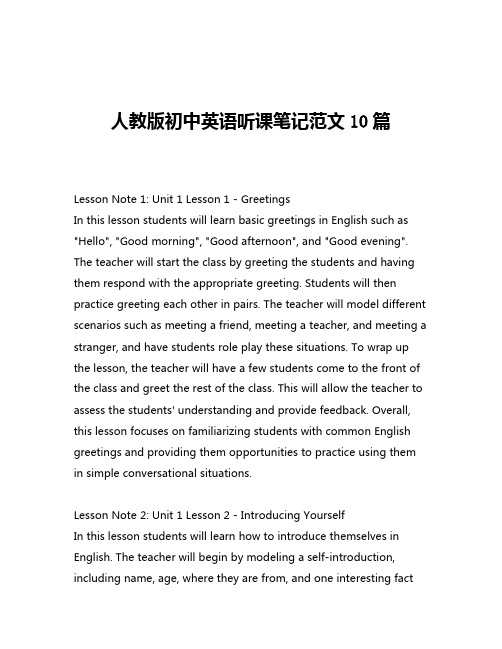
人教版初中英语听课笔记范文10篇Lesson Note 1: Unit 1 Lesson 1 - GreetingsIn this lesson students will learn basic greetings in English such as "Hello", "Good morning", "Good afternoon", and "Good evening". The teacher will start the class by greeting the students and having them respond with the appropriate greeting. Students will then practice greeting each other in pairs. The teacher will model different scenarios such as meeting a friend, meeting a teacher, and meeting a stranger, and have students role play these situations. To wrap up the lesson, the teacher will have a few students come to the front of the class and greet the rest of the class. This will allow the teacher to assess the students' understanding and provide feedback. Overall, this lesson focuses on familiarizing students with common English greetings and providing them opportunities to practice using them in simple conversational situations.Lesson Note 2: Unit 1 Lesson 2 - Introducing YourselfIn this lesson students will learn how to introduce themselves in English. The teacher will begin by modeling a self-introduction, including name, age, where they are from, and one interesting factabout themselves. Students will then practice introducing themselves to the class. The teacher will provide a sentence frame to guide the students "Hello my name is ___ I am ___ years old I am from ___ and I like ___." After the individual introductions, the teacher will have students introduce their classmates to the rest of the class. This will allow students to practice both introducing themselves and others. To wrap up, the teacher may have a small group activity where students have to interview each other and then introduce their partner to the class. This lesson focuses on giving students confidence in presenting personal information about themselves in English.Lesson Note 3: Unit 2 Lesson 1 - Talking about FamilyIn this lesson students will learn vocabulary related to family members and practice describing their own families. The teacher will begin by presenting flashcards with different family member vocabulary words and having students repeat after them. The teacher will then model describing their own family, including the names and ages of family members. Students will then work in pairs to interview each other about their families and prepare to introduce their partner's family to the class. As a wrap up activity, the teacher will call on random students to come to the front and introduce their partner's family to the class. This lesson aims to build students' confidence in using family-related vocabulary and describing their personal family situations in English.Lesson Note 4: Unit 2 Lesson 2 - Talking about PetsIn this lesson students will learn vocabulary related to common pets and practice describing the pets they have at home. The teacher will begin by showing images of different pets and having students name them in English. The teacher will then model describing their own pet, including the pet's name, type, color, and a few personality traits. Students will then work in small groups to discuss the pets they have at home and prepare to introduce one of their group member's pets to the class. As a wrap up, the teacher will call on random groups to come to the front and introduce one of their group member's pets to the class. This lesson focuses on expanding students' pet-related vocabulary and giving them opportunities to practice describing the pets in their lives.Lesson Note 5: Unit 3 Lesson 1 - Talking about Daily RoutinesIn this lesson students will learn vocabulary related to daily routines and practice describing their own daily schedules. The teacher will begin by presenting a list of common daily activities and having students repeat them. The teacher will then model describing their own daily routine using sequencing words like "first", "then", "after that", and "finally". Students will then work individually to write out their own daily schedules and prepare to present them to the class. As a wrap up, the teacher will call on random students to come to the front and describe their daily routines to the class. This lessonaims to build students' ability to talk about their daily lives and use sequencing language in English.Lesson Note 6: Unit 3 Lesson 2 - Telling TimeIn this lesson students will learn how to tell time in English. The teacher will begin by presenting analog and digital clock images and having students practice saying the time shown. The teacher will then model phrases for asking and telling the time, such as "What time is it?" and "It's 3:15." Students will then work in pairs to practice asking and telling the time. As a wrap up, the teacher may have a classroom clock that they use to call out different times and have students write down the time in their notebooks. This lesson focuses on giving students the language skills to communicate about the time in English.Lesson Note 7: Unit 4 Lesson 1 - Talking about HobbiesIn this lesson students will learn vocabulary related to common hobbies and practice describing their own interests. The teacher will begin by presenting images of different hobbies and having students name them in English. The teacher will then model describing their own hobbies, including why they enjoy those activities. Students will then work individually to write about their top 3 hobbies. As a wrap up, the teacher will call on random students to share one of their hobbies with the class. This lesson aims to build students' confidence in using hobby-related vocabulary and discussing their personalinterests in English.Lesson Note 8: Unit 4 Lesson 2 - Talking about Likes and DislikesIn this lesson students will learn how to express likes and dislikes in English. The teacher will begin by presenting a list of common likes and dislikes, such as "I like playing basketball" and "I don't like spicy food", and having students repeat after them. The teacher will then model having a conversation about likes and dislikes with a volunteer student. Students will then work in pairs to interview each other about their likes and dislikes. As a wrap up, the teacher may have students share one thing they like and one thing they dislike with the class. This lesson focuses on giving students the language skills to communicate their personal preferences in English.Lesson Note 9: Unit 5 Lesson 1 - Talking about the WeatherIn this lesson students will learn vocabulary related to weather and practice describing the current weather conditions. The teacher will begin by presenting images of different weather phenomena and having students name them in English. The teacher will then model describing the weather, using phrases like "It's sunny", "It's raining", and "It's cold outside." Students will then work in small groups to discuss the current weather and prepare to present a weather report to the class. As a wrap up, the teacher will call on random groups to come to the front and deliver a short weather report to the class. This lesson aims to build students' ability to discuss weather-relatedtopics in English.Lesson Note 10: Unit 5 Lesson 2 - Talking about SeasonsIn this lesson students will learn vocabulary related to the four seasons and practice describing the characteristics of each season. The teacher will begin by presenting images of the four seasons and having students name them in English. The teacher will then model describing the weather, activities, and clothing associated with each season. Students will then work individually to write a short paragraph describing their favorite season. As a wrap up, the teacher will call on random students to share their paragraphs with the class. This lesson focuses on expanding students' seasonal vocabulary and giving them opportunities to describe seasonal changes in English.。
初中英语听课笔记范文(共4篇)
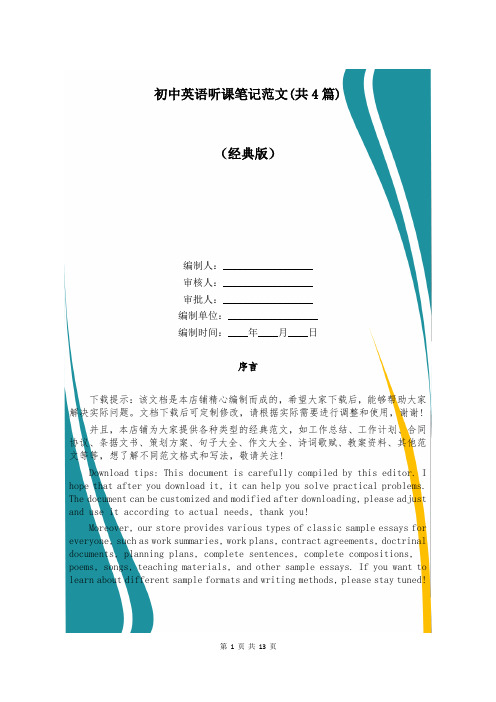
初中英语听课笔记范文(共4篇)(经典版)编制人:__________________审核人:__________________审批人:__________________编制单位:__________________编制时间:____年____月____日序言下载提示:该文档是本店铺精心编制而成的,希望大家下载后,能够帮助大家解决实际问题。
文档下载后可定制修改,请根据实际需要进行调整和使用,谢谢!并且,本店铺为大家提供各种类型的经典范文,如工作总结、工作计划、合同协议、条据文书、策划方案、句子大全、作文大全、诗词歌赋、教案资料、其他范文等等,想了解不同范文格式和写法,敬请关注!Download tips: This document is carefully compiled by this editor. I hope that after you download it, it can help you solve practical problems. The document can be customized and modified after downloading, please adjust and use it according to actual needs, thank you!Moreover, our store provides various types of classic sample essays for everyone, such as work summaries, work plans, contract agreements, doctrinal documents, planning plans, complete sentences, complete compositions, poems, songs, teaching materials, and other sample essays. If you want to learn about different sample formats and writing methods, please stay tuned!初中英语听课笔记范文(共4篇)初中英语听课笔记范文第1篇初中英语的听课笔记1.引语为一般陈述句,变为间接引语时一般由that引导(可省略)2.如果直接引语中的主语为第一人称,变为间接引语时人称要随主语作适当变化3.如果引述动词为一般过去时,间接引语中动词的时态一般推移到过去时间4.其他变化指示代词时间状语地点状语动词this―that today-that day here―there come――go these――those now-then 重点词组:out不让......进入of style不时髦的;过时的打电话给......for付款for要求same as与......同样的style时髦的;流行的on相处;进展much as possible尽可能多kind sof各种;许多the one hand,......(在)一方面......the other hand,......另一方面......初中英语听课笔记范文第2篇学校:20XX年11月16日第三节科目英语年班级6年级3班Unit5Whatdoesshedo?课题课堂教学过程授课教师一.复习全班学生一起读第四单元单词,一遍英语一遍汉语。
听课记录(人教版新目标七年级英语UNIT2 This is my sister)

听课记录(人教版新目标七年级英语UNIT2 This is my sister)人教版新目标七年级::|分类:教学|举报|字号大中小订阅授课人:何忠辉年级:七科目:英语课题:教学过程:一:,:::二三四小组讨论的图片,教师个别指导小组讨论完成的联系,齐读部分个单词两遍,强调的发音,播放两遍,一遍听,第二遍核对查漏补缺。
小组合作读对话引出语法知识点,教师总结板书五操练远距离介绍他人利用那张家庭照片介绍家庭成员听力,听力练习仿照组织对话名词变复数结合导学案操练当堂测结合导学案六::让学生上讲台上展示学习的效果。
介绍照片上的家庭成员&七板书设计近距离单数复数远距离单数复数第二篇:人教新目标九年级英语字人教新目标九年级英语—短语总结::|分类:|标签:|字号大中小订阅人教新目标九年级英语—短语总结被发明于某年某地被某人发明的被使用来做……被使用来做……可调跟的鞋高跟鞋改变鞋子的风格电池供电的拖鞋电子鞋在黑暗中看路给某人动手术需要手术加热的冰淇淋勺舀很冷冰淇淋.最有用的帮助的发明最烦恼的发明闹钟电灯泡微波炉薯条意外地,偶然地错误地在某事上犯错错吧。
当成。
==最后,终于……在。
末,尽头足够咸足够的盐…一个叫。
的厨师…一个叫。
的医生好长时间把。
撒在。
上用。
撒在。
上…直到。
才被传到西方世界…=…多于根据一个古老的中国传说古文化神农帝烧开水在户外篝火上在户外落入水里从树上摔下来摔倒——留在那里’留在某人记忆里发出一种令人愉悦的味道决定作某事品尝这种热混合物/这/那样大学生金属的馅饼碟子飞碟,飞盘扔飞盘把。
扔掉把某物扔给某人—在二十世纪五十年代在六世纪……更喜欢易碎的一副望远镜周游世界环游中国/注意某人做/正在做…注意到。
深受喜爱的为了娱乐和锻炼包括中国/出生于在室内玩在漫长的冬季在一块坚硬的木质地板上运动员们的安全撞到某人敲门……把。
划分成…。
的目的尽力做某事尝试做某事把球弄进篮子向场地的一端移动/朝。
移动,向。
初中英语听课记录
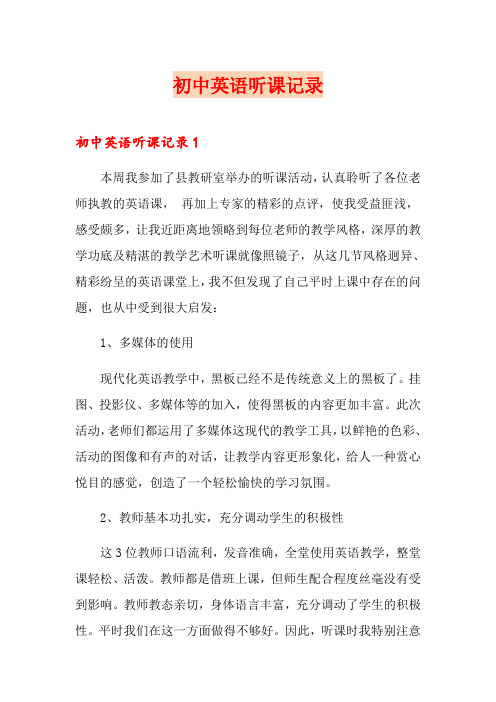
初中英语听课记录初中英语听课记录1本周我参加了县教研室举办的听课活动,认真聆听了各位老师执教的英语课,再加上专家的精彩的点评,使我受益匪浅,感受颇多,让我近距离地领略到每位老师的教学风格,深厚的教学功底及精湛的教学艺术听课就像照镜子,从这几节风格迥异、精彩纷呈的英语课堂上,我不但发现了自己平时上课中存在的问题,也从中受到很大启发:1、多媒体的使用现代化英语教学中,黑板已经不是传统意义上的黑板了。
挂图、投影仪、多媒体等的加入,使得黑板的内容更加丰富。
此次活动,老师们都运用了多媒体这现代的教学工具,以鲜艳的色彩、活动的图像和有声的对话,让教学内容更形象化,给人一种赏心悦目的感觉,创造了一个轻松愉快的学习氛围。
2、教师基本功扎实,充分调动学生的积极性这3位教师口语流利,发音准确,全堂使用英语教学,整堂课轻松、活泼。
教师都是借班上课,但师生配合程度丝毫没有受到影响。
教师教态亲切,身体语言丰富,充分调动了学生的积极性。
平时我们在这一方面做得不够好。
因此,听课时我特别注意了各地老师不同的调动学生的方式。
学生积极性调动起来以后,怎样保持下去也很重要。
老师在每个教学环节中对孩子的要求一定要清楚明确,难易适中。
只有孩子清楚的知道自己应该干什么时,才有可能干好这件事;而问题太难孩子会无从下手,太易又不用思考,这都会打击孩子的积极性。
3、教师自身素质高,重视学生的情感教育教师自身的良好素质是讲好课的重要前提和基本保证在听课中我发现每位老师的基本功都很扎实尤其是元老师,她的教态亲切自然,端庄大方,充分利用肢体语言,使人如沐春风,吸引学生同时,重视学生的情感教育,挖掘了德育因素根据教学内容,挖掘教学因素,对学生进行德育教育。
4、情境的设置英语的学习要求在语境中学习句子,在句子中学习单词。
这就是说我们在教给学生一句话、一个词时还要给学生创设一定的情境,让学生学会在一定的情境中学会用句子、词语。
所创设的情境如何即利于课文的导入,也利于重点单词、句子的引出是一节课成败的重要方面。
七年级英语听课笔记范文10篇
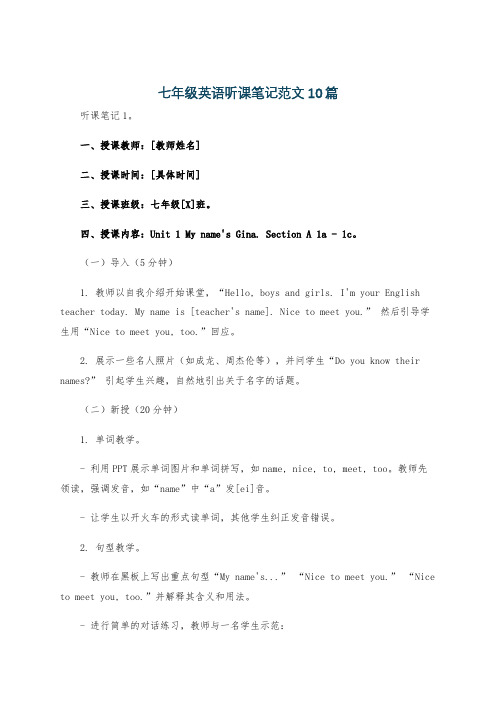
七年级英语听课笔记范文10篇听课笔记1。
一、授课教师:[教师姓名]二、授课时间:[具体时间]三、授课班级:七年级[X]班。
四、授课内容:Unit 1 My name's Gina. Section A 1a - 1c。
(一)导入(5分钟)1. 教师以自我介绍开始课堂,“Hello, boys and girls. I'm your English teacher today. My name is [teacher's name]. Nice to meet you.”然后引导学生用“Nice to meet you, too.”回应。
2. 展示一些名人照片(如成龙、周杰伦等),并问学生“Do you know their names?”引起学生兴趣,自然地引出关于名字的话题。
(二)新授(20分钟)1. 单词教学。
- 利用PPT展示单词图片和单词拼写,如name, nice, to, meet, too。
教师先领读,强调发音,如“name”中“a”发[ei]音。
- 让学生以开火车的形式读单词,其他学生纠正发音错误。
2. 句型教学。
- 教师在黑板上写出重点句型“My name's...”“Nice to meet you.”“Nice to meet you, too.”并解释其含义和用法。
- 进行简单的对话练习,教师与一名学生示范:T: Hello! What's your name?S: My name's Li Ming.T: Nice to meet you.S: Nice to meet you, too.- 然后让学生两人一组进行练习,教师巡视并给予指导。
(三)听力练习(10分钟)1. 教师介绍听力任务,让学生听1a中的对话,圈出听到的名字。
2. 播放听力材料,学生完成任务。
3. 核对答案,教师再次播放听力材料,让学生注意听名字的发音。
(四)课堂小结(3分钟)教师引导学生回顾本节课所学的单词和句型,强调重点单词的发音和句型的用法。
初中英语听评课记录模板范文

初中英语听评课记录模板范文As a student of grade 7, I had the opportunity to attend an English listening and evaluating class. The class was conducted by our English teacher, Mr. Smith. The main objective of the class was to sharpen our listening skills and improve our ability to understand spoken English.Firstly, Mr. Smith played a short audio clip of a conversation between two people discussing their weekend plans. He asked us to pay close attention and take notes while listening. After the clip ended, Mr. Smith asked us a series of questions to test our comprehension of the conversation. He also asked us to share our notes and compare them with those of our classmates. This exercise not only helped us improve our listening skills but also encouraged teamwork and collaboration.Next, Mr. Smith played a dialogue from a movie and asked us to identify the emotions and intentions of the characters based on their tone of voice and choice of words. This was an interesting and challenging task as it required us to consider both verbal and non-verbal cues. Mr. Smith then discussed with us the importance of understanding the subtleties of spoken language in order to fully comprehend the message being conveyed.In the final part of the class, Mr. Smith encouraged us to engage in a role-playing activity where we had to act out a given scenario using appropriate language and intonation. This activity not only tested our listening skills but also provided us with an opportunity to apply what we had learned in a practical setting.Overall, the listening and evaluating class was an enriching experience that not only improved our listening skills but also helped us understand the nuances of spokenEnglish. Mr. Smith's innovative teaching methods and interactive approach made the class both engaging and effective. I look forward to more such classes in the future.。
初中英语听课记录及评析
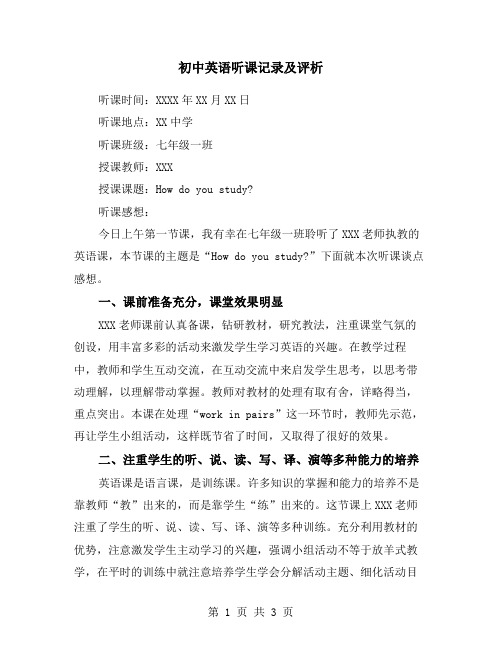
初中英语听课记录及评析听课时间:XXXX年XX月XX日听课地点:XX中学听课班级:七年级一班授课教师:XXX授课课题:How do you study?听课感想:今日上午第一节课,我有幸在七年级一班聆听了XXX老师执教的英语课,本节课的主题是“How do you study?”下面就本次听课谈点感想。
一、课前准备充分,课堂效果明显XXX老师课前认真备课,钻研教材,研究教法,注重课堂气氛的创设,用丰富多彩的活动来激发学生学习英语的兴趣。
在教学过程中,教师和学生互动交流,在互动交流中来启发学生思考,以思考带动理解,以理解带动掌握。
教师对教材的处理有取有舍,详略得当,重点突出。
本课在处理“work in pairs”这一环节时,教师先示范,再让学生小组活动,这样既节省了时间,又取得了很好的效果。
二、注重学生的听、说、读、写、译、演等多种能力的培养英语课是语言课,是训练课。
许多知识的掌握和能力的培养不是靠教师“教”出来的,而是靠学生“练”出来的。
这节课上XXX老师注重了学生的听、说、读、写、译、演等多种训练。
充分利用教材的优势,注意激发学生主动学习的兴趣,强调小组活动不等于放羊式教学,在平时的训练中就注意培养学生学会分解活动主题、细化活动目的、选择活动方法、控制活动进程等,而不是在公开课上的作秀。
同时教师也参与其中,和学生一起活动,使课堂气氛达到了高潮。
三、注重评价和反馈在教学过程中XXX老师注重了评价和反馈这一环节。
评价是为了检验学生的知识掌握程度,反馈是为了调节下一步的教学进度和难度。
本节课上XXX老师采用多种方式进行评价和反馈:师生互动评价、小组评价、自我评价等。
评价方式有口头表扬、动作暗示、书面表扬等形式。
通过这些方式使学生及时了解自己的学习状况,对于出现的错误能及时调整并改正。
四、板书设计合理本节课的板书设计合理有序,体现出了本节课的重难点。
板书设计简洁明了,使学生一目了然,便于学生理解和记忆。
英语听课评课记录范文(必备15篇)
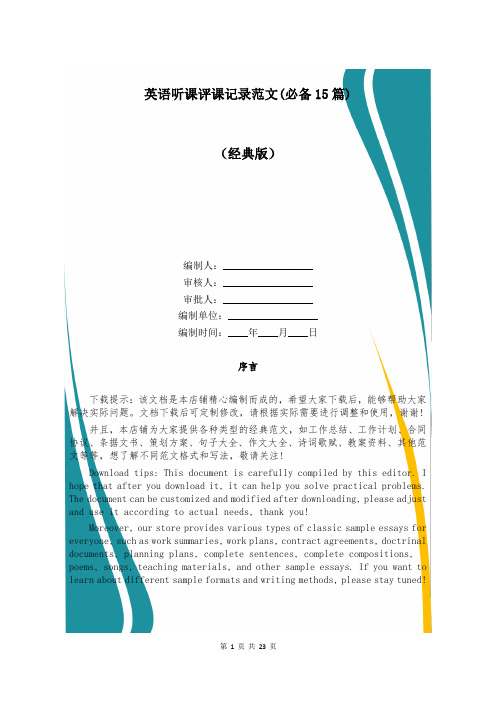
英语听课评课记录范文(必备15篇)(经典版)编制人:__________________审核人:__________________审批人:__________________编制单位:__________________编制时间:____年____月____日序言下载提示:该文档是本店铺精心编制而成的,希望大家下载后,能够帮助大家解决实际问题。
文档下载后可定制修改,请根据实际需要进行调整和使用,谢谢!并且,本店铺为大家提供各种类型的经典范文,如工作总结、工作计划、合同协议、条据文书、策划方案、句子大全、作文大全、诗词歌赋、教案资料、其他范文等等,想了解不同范文格式和写法,敬请关注!Download tips: This document is carefully compiled by this editor. I hope that after you download it, it can help you solve practical problems. The document can be customized and modified after downloading, please adjust and use it according to actual needs, thank you!Moreover, our store provides various types of classic sample essays for everyone, such as work summaries, work plans, contract agreements, doctrinal documents, planning plans, complete sentences, complete compositions, poems, songs, teaching materials, and other sample essays. If you want to learn about different sample formats and writing methods, please stay tuned!英语听课评课记录范文(必备15篇)英语听课评课记录范文第1篇随着学科领域整体改革的深入发展,英语课堂教学也发生可喜的变革。
七年级下册英语听课记录

七年级下册英语听课记录七年级下册英语听课记录:The Listening ClassIn the listening class today, we learned about different types of weather and how to describe them. The teacher started by playing a recording of a weather report, which described the current weather conditions in a city. The students were asked to listen carefully and take notes on the weather information provided.After listening to the weather report, the teacher asked the students to share what they had heard. One student mentioned that the weather in the city was sunny and hot, with temperatures reaching 30 degrees Celsius. Another student mentioned that there was a chance of rain later in the day. The teacher praised the students for their active listening and encouraged them to use descriptive words and phrases to talk about the weather.Next, the teacher played another recording, this time featuring a conversation between two friends talking about their favorite seasons. The students listened attentively and were asked to answer questions based on the conversation. The teacher then went on to explain the key vocabulary and phrases used in the conversation, such as "summer vacation," "snowy mountains," and "spring flowers." The students practiced repeating these words and phrases after the teacher, focusing on pronunciation and intonation.As a listening comprehension exercise, the teacher then played a series of short recordings with various weather situations. The students had to listen carefully and match each recording with the corresponding picture displayed on the board. This exercise helpedthe students improve their listening skills and ability to recognize and understand different weather conditions.To engage the students further, the teacher introduced a fun listening game called "Weather Charades." The students had to act out different weather conditions without using any words while their classmates tried to guess what they were acting. This game not only reinforced the vocabulary and phrases related to weather but also improved the students' ability to interpret non-verbal cues.The class ended with a listening practice activity where the students had to listen to a song about different weather and fill in the missing words. The students showed enthusiasm in singing along to the catchy tune and completed the missing words accurately.Overall, the listening class was engaging and interactive. The teacher used a variety of listening materials, such as weather reports, conversations, and songs, to help the students improve their listening comprehension skills. The activities, including note-taking, question answering, matching, charades, and filling in the missing words, kept the students actively involved throughout the class. Through this class, the students not only learned vocabulary and phrases related to weather but also practiced their listening and speaking skills effectively.。
七年级下册英语Unit9Whatdoeshelooklike?《setionB1a-1e》听课记录2

2024七年级下册英语Unit 9 《What does he look like?》Section B 1a-1e 听课记录一、导入(1.1)教师行为:1.教师首先播放一段简短的关于人物外貌描述的视频片段,以此激发学生的兴趣并引入本节课的主题。
2.提出问题:“What did you notice about the people in the video? Whatdid they look like?” 让学生分享观察到的外貌特征。
学生活动:1.学生观看视频片段,并集中注意力观察人物的外貌特征。
2.学生积极回答教师的问题,分享自己观察到的外貌特征。
过程点评:导入环节的视频片段成功吸引了学生的注意力,为后续的学习活动打下了良好的基础。
教师的问题引导学生关注人物的外貌特征,为接下来的学习做了铺垫。
二、教学过程(1.2)1. 1a部分教师行为:•展示1a部分的图片,让学生快速浏览并识别出图片中人物的外貌特征。
•提问学生:“What does he/she look like?” 引导学生用完整的句子描述人物的外貌。
学生活动:•学生观察图片,识别出人物的外貌特征。
•学生尝试用完整的句子描述人物的外貌,如:“She has long hair and big eyes.”通过图片展示和提问的方式,教师有效地引导学生进行了外貌描述的练习。
学生的参与度高,表达积极。
2. 1b部分教师行为:•播放录音,让学生根据录音内容匹配图片中的人物和描述。
•核对答案,并让学生跟读录音,模仿发音和语调。
学生活动:•学生认真听录音,并根据录音内容匹配图片中的人物和描述。
•学生跟读录音,模仿发音和语调。
过程点评:听力活动的设计有助于提高学生的听力理解能力,跟读练习则有助于提高学生的发音和语调。
3. 1c部分教师行为:•将学生分成小组,让他们根据1a部分的图片进行对话练习,描述图片中人物的外貌。
•巡视指导,确保每个学生都能参与到对话练习中。
初中英语听课记录范文

初中英语听课记录范文前言英语作为一门重要的外语,是我们学生必须学习和掌握的一项技能。
在学习英语的过程中,听力是其中非常重要的一环。
因此,在上课的时候,我们要认真听讲,积极参与课堂。
今天我来分享一下我在初中英语听课的经验和体会。
正文我国的英语教育从小学开始,但是初中的英语学习更加重视听力和口语的培养。
在上初中的几年,我参加了许多英语听课和听力测试,这些经历帮助我提高了我的英语听力技能。
在这里,我将分享我在初中英语听课中的一些体会和经验。
不断提高自己的英语听力第一条经验是要不断提高自己的英语听力技能。
对于英语学习初学者来说,英语听力可能是最困难的一部分,因为需要适应不同的语言和口音。
在初中英语听课中,我会尽量去听一些难度较高的英语听力材料,因为只有这样,才能更好的升级自己的听力水平。
做好笔记在英语听课中,做好笔记也是非常重要的。
在听课的同时,我们要做好笔记,记录下老师讲的重点和难点,这能够帮助我们更好地理解和牢记知识点。
同时,在复习的时候,通过阅读笔记可以快速回顾课程的重点和难点,有利于深化对知识点的学习。
学会倾听在英语听课中,学会倾听是相当重要的一点。
要积极参与课堂活动,认真聆听老师的讲解和同学的发言。
尤其是在学习英语口语时,我们需要准确理解老师和同学们的话语,从而正确运用语法和发音。
多做听力练习在课余时间,我们可以多做听力练习。
这样可以巩固课堂所学的知识,提高听力技巧。
在初中英语学习中,有许多听力练习材料可供我们选择,我们可以选择一些短语、歌曲或英语小故事来听,听力训练可以让我们更好地适应英语语音和口音,也能提高我们的听力水平。
结语英语听力是英语学习的重要环节,只有在听力技巧得到锻炼后,英语学习才能得到更好的提高与深入。
通过完善自己的英语听力技能,我们可以在英语学习上更好的通行。
感谢老师们、同学们的支持,期待我们通过不断听力练习和学习,更好的提升自己的英语水平。
- 1、下载文档前请自行甄别文档内容的完整性,平台不提供额外的编辑、内容补充、找答案等附加服务。
- 2、"仅部分预览"的文档,不可在线预览部分如存在完整性等问题,可反馈申请退款(可完整预览的文档不适用该条件!)。
- 3、如文档侵犯您的权益,请联系客服反馈,我们会尽快为您处理(人工客服工作时间:9:00-18:30)。
初一英语听课记录范文(2)初一英语听课记录范文篇31.引语为一般陈述句,变为间接引语时一般由that引导(可省略)2.如果直接引语中的主语为第一人称,变为间接引语时人称要随主语作适当变化3.如果引述动词为一般过去时,间接引语中动词的时态一般推移到过去时间4.其他变化指示代词时间状语地点状语动词this—that today-that day here—there come--go these--those now-then Read the passage. Describe the sentences are from the radio review (R) or the newspaper review (N) 1. “ It’s an excellent film, with terrific special effects.”2. “ Altho ugh the special effects are fantastic, it’s a disappointing film.”3. “The film is very long, and becomes boring.”4. “Elijah Wood’s scenes are boring.5. “Ian Mckellen is much better and his scenes are great.”Read the passage then answer the questions1. Read Paragraph 2 and answer the following questions 1). What did Chen Huan say the type of Pirates of the Caribbean? 2). What did Chen Huan say about the actors?2. Read Paragraph 3 and answer the following questions 1). Why are Depp and Bloom sailing around the island? 2). Who do they meet? 3). Why is there lots of action in the film? 4). Who does Keira Knightley play?3. Read Paragraph4 and check the sentences 1) The film is really true to our life. 2) Chen Huan thought there was too much fighting in the film. 3) Chen Huan didn’t like the film at all Students can practice like this: Jane: Did you hear Chen Huan’s culture report yesterday? Adam: No, I didn’t. What did she say ? Jane: It was about Pirates of the Caribbean. He said it was on at the student cinema. Adam: Whatdid he say about it ? Jane: He said that… Write a short report about the film Chen Huan thought of,Ask some students to show it. 重点词组:1. keep out不让......进入2. out of style不时髦的;过时的3. call sb. up打电话给......4. pay for付款5. ask for要求6. the same as 与......同样的7. in style时髦的;流行的8. get on相处;进展9. as much as possible尽可能多10. all kinds of各种;许多11. on the one hand, ......(在)一方面,...... 12. on the other hand, ......另一方面,......掌握词组和句型的语法结构和用法。
Homework:1..Listen and read after the tape for 15 minutes.(P50-2) 初中英语课听课记录中学英语评课笔记Step:Warmingup.Anactivitynamed“AreyousmarterthanapupilofGradeThree?”(本堂课对英语课堂现状的一种颠覆,课堂中,让学生看老师“出丑”,考倒老师,让老师说:IamnotsmarterthanapupilofGradeThree.确实吸引了听课老师的注意力,但是是不是值得推广,还是值得思考的。
)StepPre-taskpreparationA.Selectoneofthelisteditemsandtrytosolvetheproblem.anizeacontestbetweenthestudentsandteachers.StepWhile-teachingproceduresA.ElicitthemascotofBeijingOlympicgames.B.HelpstudentstogetfamiliarwithFuwa.C.Encouragethestudentstoexpresstheirdesireofcherishtheani mals. (接下来,通过看一段福娃的录像,让学生学习五个单词pandaswallow,fish,Tibetanantelope来教学Ilikeanimals.Toyoulike„..?S:Ilike(让学生集体问,全体教师回答,以此方式来进行操练,同样在其他的公开课上及其少见的。
虽然利用听课教师的这一资源,但是学生之间的操练非常少。
) StepAssignmentMakeachantandchantittogether. (然后将这些串成一个说唱,在说唱的结束再加上了中文。
也是少见的chant. 整堂课让所有的学生和老师都互动一起了。
充分利用做到了教学资料的整合。
)初中英语课听课记录中学英语评课笔记听完x老师与众不同的英语课,感想颇多,该教师良好的素质,是有目共睹的,他对英语课堂的大胆颠覆的勇气是值得大家钦佩的。
虽然这不是一节完美的课,但是x老师在教学中所折射出的教学理念是先进,这点是毋庸置疑的,是非常值得我们学习的。
听完课,他让在场的老师真正感受到了“教无定法”。
该教师打破常规,选择了人与动物和谐关系的话题。
在进行课题引入是的时候,让学生看一段录像,创设了无声胜有声的情境。
接下来不失时机的让学生用学过的英语进行交流。
利用最好的环境(在场的英语老师)来进行教学。
让英语老师们把自己很靓丽的部分展示出来。
这样自然的引入就非常的合时宜。
该教师能准确把握三年级的学生的特点,准确把握时代的脉搏,该教师选择了奥运,选择了福娃。
虽然该教师教学的时候没有什么特别的目标,但是正如一位资深的英语教研员所所的,语言的教学的最终目标不仅仅是让学生学会运用,该教师达成的是教育的大目标,这就是是塑造人,培养人,熏陶人。
而这些,x老师都做到了。
. 课前朗读,复习单词2. Greetings ---- What's the weather like today? Sunny.紧接着复习其他表示天气的单词。
cloudy, rainy, sunny, windy, fine, etc. 然后,启发学生说出另外一些表示天气的单词:warm, cold, cool, hot, etc.启发的方法是通过师生问答开展的。
教师问:What's the weather will be like if it's rainy? 然后学生回答说:It'll be wet.3. 由 It's a fine day. 复习感叹句的表达形式。
How fine the day is! 当这一句话学生表述存在问题的时候,教师及时通过 What a fine day it is ! 启发,并最终让学生顺利说出下面的句子: How fine it is! 接着,进一步问道:如何赞扬一个人呢?引出下列单词:clever, smart, careful, hard, hard-working, 然后说: He isa hard-working student. I'll learn from him.4. 朗读Lesson 60 课文内容,之后,通过看幻灯片,谈论图片内容;(感觉在这一过程中,教师中文组织教学太多。
如:首先,我们见到图画中有什么?像这样的句子完全可以直接用英语组织进行。
教师通过幻灯片呈现故事,在故事的呈现中渗透语言知识,形式很好。
如果能就图片提出一些目的性更强、有效性更高的问题就好了。
)接着,教师继续由图片、话题引出。
The dog is our best friend. We should take good care of it. 这两句话可否连起来呢?让学生说出:The dog is our best friend and we should take good care of it.5. 检查上次作文情况并步入正题----初三升中专题复习--书面表达在这一环节中,让学生做老师,阅读并修改作文,谈谈他们的好与不好到底何在,应当如何修改。
6. 朗读范文听课意见与随想总体感觉:朱老师在课堂教学中表现出了扎实的教学基本功和丰富的教学经验,并展示出了教师关爱学生、循循善诱等方面的教学特点。
特别是在知识的引入过程中,十分注重启发学生思维,并在这一过程中努力提高学生的想象力和益友语言知识的运用能力。
随想与建议:1. 书面表达是语言学习过程中语言输出的部分。
它不是被动的语言输入,而是积极的主动输出。
可以说,书面表达对于初三的同学来说,是最难的一个能力项目了。
2. 思考:如何提高学生作文或书面表达能力呢?我觉得:第一,应当给与学生足够正确的语言输入;第二,应当专设书面表达作文课。
